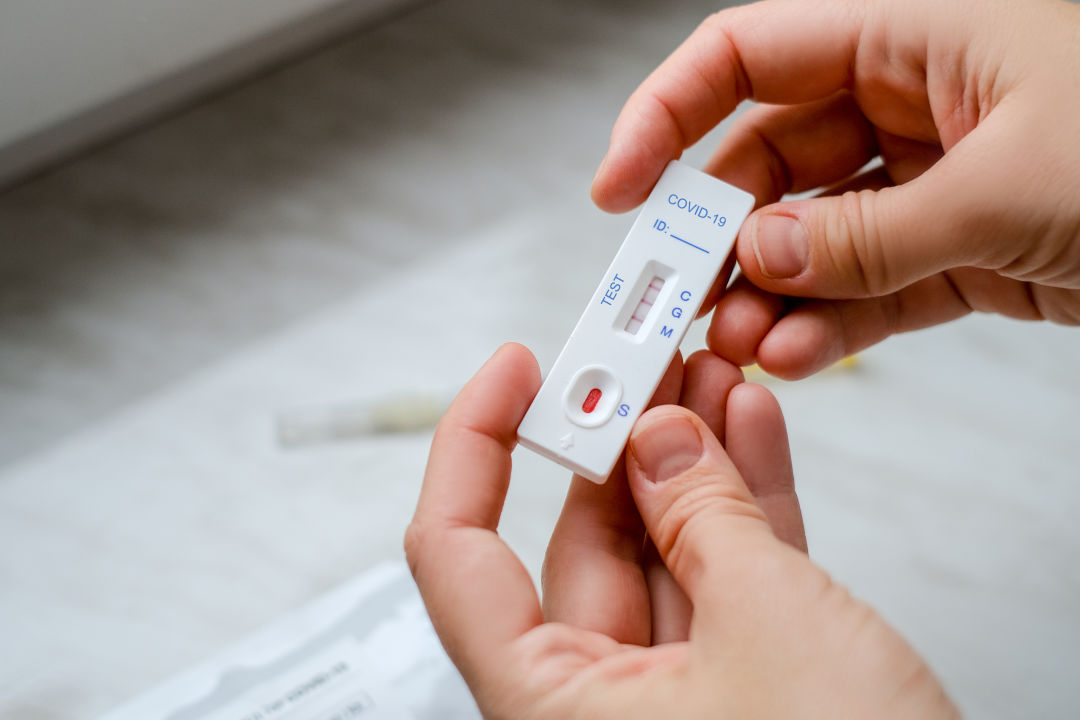Do Your At-Home Covid-19 Tests Expire?

If you've kept a stockpile of rapid Covid-19 tests in your bathroom cabinet, you may want to check the labels for expiration dates.
Turns out, these tests can expire and, depending on the brand, will all go bad at different times. Some might have a six-month shelf life, while others can last up to 15 months. Even though all of the tests work the same by detecting antigens (pieces of viral protein) from a swab sample, they all expire at various times because of the regulatory processes they go through prior to being sold.
The Food and Drug Administration is in charge of determining the shelf life of these tests. For other types of non-Covid tests, manufacturers are allowed to determine shelf life using a process called "accelerated dating," which speeds up shelf-life conditions to see how well they will last in a matter of weeks.
With rapid Covid tests, however, determining shelf life takes much longer because it must be done in real time. That means a home Covid test that was developed in 2020 will need to stay on a shelf for two years, then used within a controlled lab study to see if it is still effective.
So what does this mean for consumers? Do you have to throw away and waste tests you've been saving?
Not necessarily.
As time goes on, expiration dates are being extended based on data that's collected. So, a test that originally said it in would expire in six months may become nine or 12 months.
"The stamped date on the label can be different from the actual expiration date, so it's important to check the FDA website for more information," says CAN Community Health infectious disease specialist Dr. Douglas Brust.
Most tests have a six month expiration date. If you have a test that's expired, you can call the manufacturer or check the FDA's online authorization letters to see if the date has changed and it's still good.
No matter what, it's important to get tested as soon as you feel Covid-like symptoms. Here's what you can do to ensure the tests you have at home are most effective.
View the FDA's regulatory documents online.
Shelf life dates are frequently being tested and extended. The FDA's website has a link for antigen tests and molecular tests showing the latest updates. One brand, BinaxNOW, for example, has data which extended shelf life from 12 to 15 months.
You can still use home tests that are just a few days out of date if you are experiencing Covid symptoms rather than throwing the tests away. This will also help mitigate test shortages at pharmacies.
Keep tests stored at room temperature.
Store the tests in dry conditions and don't let them freeze or overheat, like in the car. When you shop for a home test, check expiration dates in the store and find one with a long shelf life. Pay attention to the date on your current home tests and use ones that are closer to becoming expired first.
If you ordered free tests from the government, make sure they are brought inside the house as soon as possible and not left outside in the heat or cold. Do not use tests that have already been opened.
"The tests are designed to withstand changing temperatures when shipped, but they have to be brought back to room temperature before use," says Brust.
When using a test, make sure the control lines show up quickly.
This is an indicator that the test is still working. Medical experts say these tests are very stable. If the control line is showing up and you are taking the test within 18 to 24 months of its manufacture date, you should assume the test is working.
Use tests as needed.
Take a test immediately if you are experiencing Covid-19 symptoms. If you were exposed to someone with Covid-19, wait at least five days after your exposure. If you test negative, test again one to two days after your first test.
"Use tests based on who is sick in your household, and don't use a test past the expiration date found on the website," says Brust.
If you are planning on going to an indoor event, consider testing immediately before the event, especially if you will be in contact with immunocompromised, elderly or unvaccinated individuals.
If your test is positive, stay home for at least five days and isolate. Make sure you let your close contacts know you are positive and wear a well-fitted mask around others when needed. Contact your healthcare provider if you have concerns about symptoms.
For more information on where to get tested and vaccinated for Covid-19, click here. For more home test information, visit the Centers for Disease Control and Prevention website and Food and Drug Administration website.
For more information about at-home Covid tests, click here.



